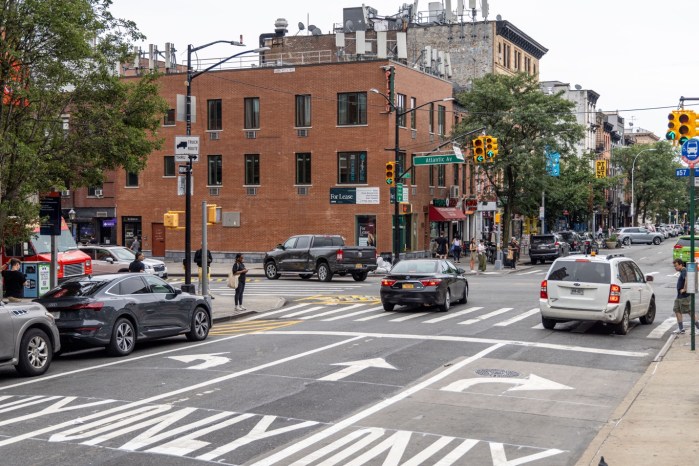Somebody lend them a hand!
Brooklyn’s more than century-old library system is feeling its age, and the borough’s beloved book lender is struggling under the weight of decades-old buildings that require multimillion-dollar renovations.
The city has committed an unprecedented $278 million in capital funding to prop up Brooklyn Public Library over the next 10 years, but the book lender remains $247 million shy of meeting its repairs quota, and experts say only the taxpayers can prevent Brooklyn’s beloved libraries from literally falling apart.
“We’re an old city, an aging city, and the library is no exception,” said Eli Dvorkin of the Manhattan-based economic policy think tank Center for an Urban Future. “No matter how you slice and dice it, the city has to invest more.”
The nation’s sixth-largest book-lending system, Brooklyn Public Library consists of 59 branches with an average age of more than 60 years old. One of its most senior branches, the Andrew Carnegie-built Pacific Branch in Park Slope, debuted in 1904 and suffers from nearly $12 million in unfunded repairs, including interior and exterior renovations, along with needed heating and electrical upgrades.
Meanwhile, the Williamsburg branch on Division Avenue has a $14.7 million shortfall, the Sheepshead Bay branch needs $10.6 million for drainage repairs, air conditioning upgrades, and rent, and the DeKalb branch on Bushwick Avenue requires $9.4 million for general repairs inside and out.
Worst of all is the library’s grand Central Branch in Prospect Heights, which the library lists as requiring $63.5 million worth of “various improvements.”
These unfunded repair tabs are what remain after considering the nearly $280 million in public funds the city will provide the library system between 2020 and 2029, most of which is being allocated towards small, easily managed projects, such as fixing roofs or air-conditioning, and not overhauling decades-old structures, according to a senior finance official with the organization.
“We have lots of piecemeal projects,” said Karen Sheehan, the library’s executive vice president for finance and administration. “We don’t have a reserve of capital dollars that are earmarked for the major overhauls.”
And in lieu of another $200–300 million taxpayer-funded windfall, Brooklyn Public Library has been forced to explore alternative strategies for generating revenue, including some deals that readers have found unsavory.
In 2014, the book lender sold the historic Brooklyn Heights branch at Cadman Plaza West for $52 million to developer Hudson Companies, which razed the building in 2017 and is in the process of erecting a 38-story luxury condo tower, which will feature a three-story library branch at its base come 2020.
The deal relieved the library system of an ailing branch and paved the way for construction of a new one, but local bookworms nonetheless condemned the scheme as a deal with the devil, and accused library executives of pandering to developers.
“The public’s interest has not been the primary concern,” Pearl Hochstadt, a Brooklyn Heights resident since 1953, said back in 2014. “There’s been too much consideration for real estate interests.”
Other partnerships have been less controversial. The library system partnered with a nonprofit affordable housing developer, the Fifth Avenue Committee, in 2016 to demolish the old Sunset Park Library and redevelop the site on Fourth Avenue to feature a much larger branch, along with 49 units of affordable housing due in 2020.
“The old library was about 12,000 square feet and was one of the busiest in our system,” said David Woloch, executive vice president for external affairs at Brooklyn Public Library. “It was essentially bursting at the seams and we’re going to get a library that’s about 20,000 square feet.”
The library is also taking advantage of a 2011 settlement with Exxonmobil over an oil spill in Newtown Creek to replace its Greenpoint branch, and has worked out a deal with Brooklyn Children’ Museum to move their Bower Street branch into the Crown Heights cultural institution.
But for all of Brooklyn Public Library’s wheeling and dealing, the book lender remains buried under the weight of aging buildings that need immediate repairs, according to Woloch, who claims the city must act if it wants to salvage a library system that isn’t getting any younger.
“Rather than doing the work in drips and drabs and fixing an air conditioner and a couple of years later a roof there, the smart way to do this work — it requires planning and it requires more funding — is to do as much of the work holistically,” he said. “The longer we go without tackling those needs the larger they get.”
























